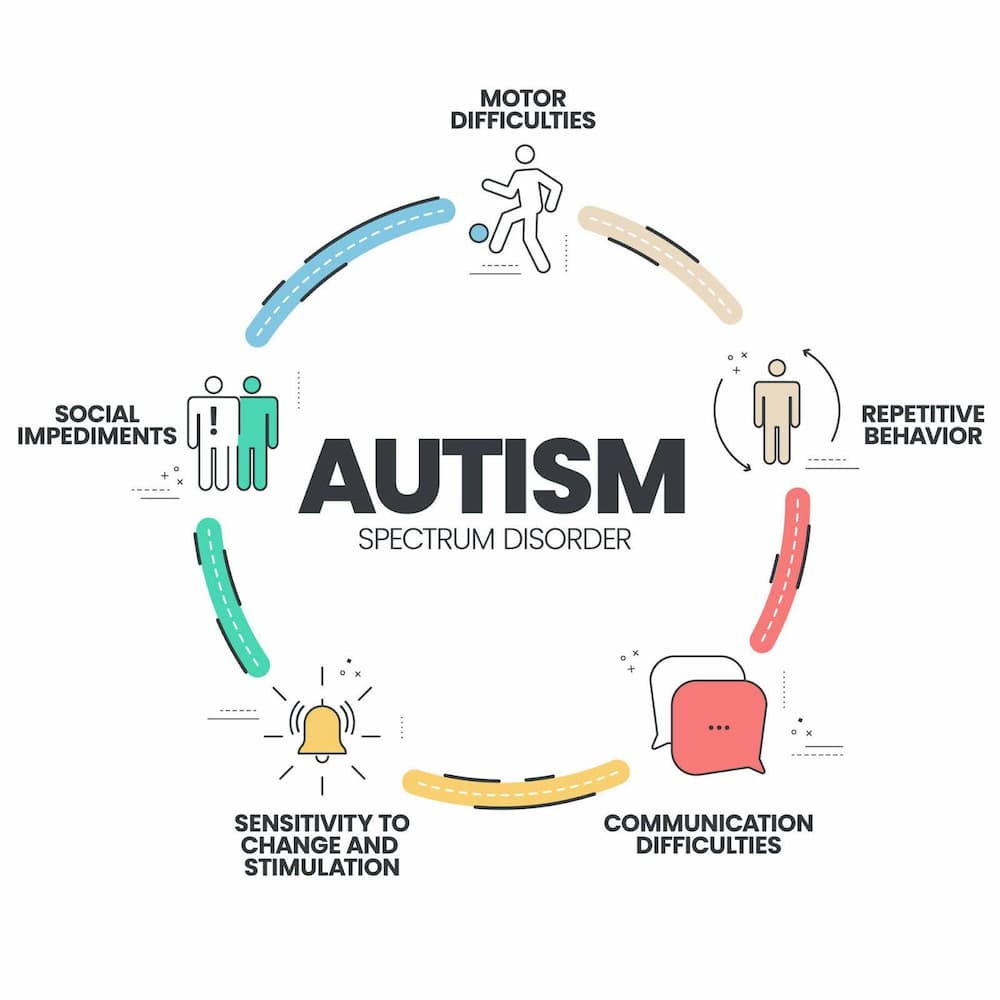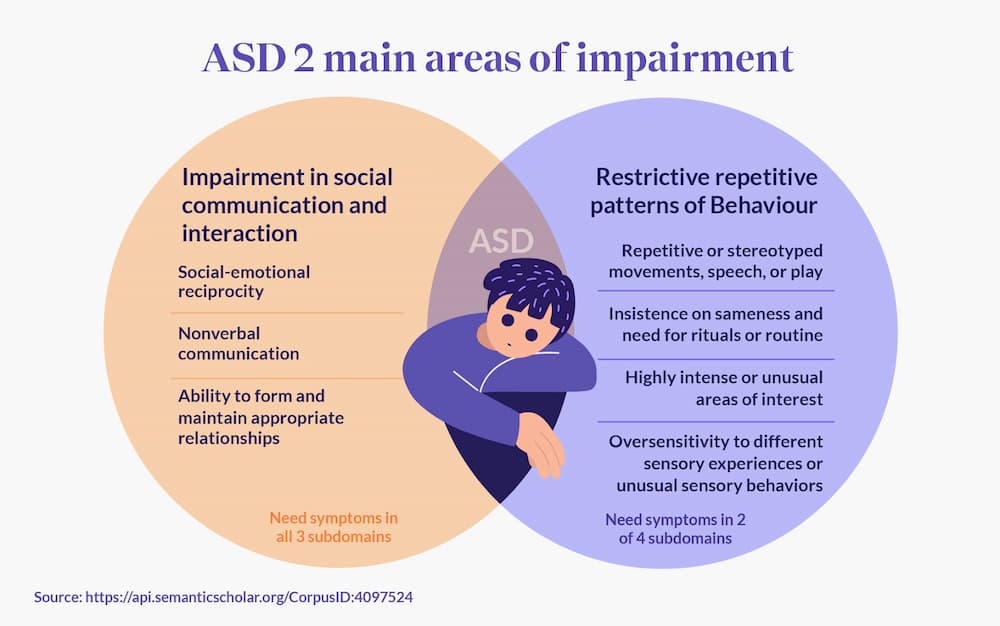Top 7 techniques an Autism Spectrum Therapies can assist with daily interaction challenges
Top 7 techniques an Autism Spectrum Therapies can assist with daily interaction challenges
Blog Article
Secret Indicators and Signs And Symptoms to Recognize in Individuals With Behavior Autism
When you encounter a person with behavior autism, recognizing key indicators and signs is vital. Furthermore, sensory sensitivities can lead to frustrating experiences.
Difficulties in Social Interactions
When you connect with a person on the autism spectrum, you could observe they battle with social cues and communication. These challenges can make social communications really feel frustrating for them. You may see them avoiding eye get in touch with or standing too close or also far during discussions, which can create misunderstandings. They might not notice body language or faces, making it harder for them to assess exactly how others are feeling.
When they do involve, they could chat regarding their rate of interests in great detail without observing if you're interested. Recognizing these obstacles can help you approach interactions with compassion and patience, fostering a more comfortable setting for both of you.
Difficulty With Verbal and Non-Verbal Communication

Non-verbal communication can be much more challenging. You could see a lack of eye call or restricted usage of motions, which can make interactions feel awkward. Facial expressions may not constantly align with the discussion, resulting in confusion regarding their feelings. Acknowledging these signs is important, as it helps you far better support and involve with people on the autism range. By comprehending their communication difficulties, you can cultivate much more significant connections and supply a more helpful setting.
Recurring Actions and Regimens
Communication difficulties often accompany other indications of autism, such as recurring behaviors and a strong preference for routines. You could observe that individuals with autism often engage in details, repeated actions, like hand-flapping, rocking, or repeating expressions. These habits can supply convenience and a feeling of control in a frequently overwhelming world.
Regimens are equally crucial; numerous people flourish when they follow an organized routine. You may find that changes to these routines can cause considerable distress. For instance, if they have an everyday ritual of eating breakfast at a certain time or complying with a specific route to college, any kind of interruption can create anxiousness.
Identifying these patterns assists you recognize their actions and give assistance. By accommodating their need for regular and permitting repeated activities, you can produce a more comfy atmosphere that eases their obstacles.
Sensory Sensitivities

Typical Sensory Triggers
Sensory sensitivities can considerably affect daily life for individuals with autism, as certain stimulations usually set off frustrating reactions. Typical sensory triggers include loud noises, intense lights, and strong smells. You may discover that abrupt sounds, like alarm systems or sirens, trigger anxiousness or distress. Similarly, fluorescent illumination in shops can feel extreme and awkward. Appearances can likewise play a substantial duty; rough fabrics or certain food structures might be unbearable for you. In addition, crowded locations can bewilder your senses, making it tough to unwind or focus. Comprehending these triggers can help you manage your setting much better. By understanding what impacts you, you can take actions to lessen pain and boost your day-to-day experiences.
Behavioral Reactions Described
Recognizing your behavioral reactions to sensory sensitivities is important, as they typically expose how you connect with the globe. You may observe that specific sounds, lights, or appearances bewilder you, resulting in anxiety or pain. When encountered with these stimuli, you could withdraw, cover your ears, and even respond boldy. These reactions aren't just peculiarities; they're your method of dealing with overstimulation. You may additionally find on your own seeking certain sensory experiences, like deep pressure or peaceful environments, to aid ground yourself. Identifying these patterns aids you understand your needs far better and can guide just how you communicate them to others. By acknowledging your sensory level of sensitivities, you can function in the direction of creating a setting that really feels much more workable and comfy for you.
Coping Strategies Introduction
Acknowledging your sensory level of sensitivities is just the first step; currently it's time to check out coping strategies that can aid you take care of those experiences properly. Start by developing a sensory toolkit customized to your requirements. This could include noise-canceling my latest blog post earphones, fidget playthings, or soothing aromas. Developing link an organized regimen can also provide predictability, lowering stress and anxiety around sensory overload. Take breaks in a silent space to collect yourself when you feel overwhelmed. Practicing mindfulness methods like deep breathing can aid ground you in the moment. Furthermore, interact your demands with those around you; having encouraging family and friends can make a substantial distinction. Bear in mind, finding what functions finest for you may require time, so be patient and open to trying new approaches.
Restricted Passions and Focus
While several individuals develop a large range of rate of interests, those with autism usually demonstrate restricted rate of interests and an extreme concentrate on specific subjects. You might observe that somebody with autism can invest hours diving right into their favored subject, whether it's a particular type of train, a specific movie, or a clinical principle. This intense focus isn't simply a pastime; it can become a central component of their identity and social interactions.
You might find that discussions focus on these rate of interests, and they might battle to participate in broader subjects. For them, these concentrated passions offer convenience and a feeling of proficiency. While it is necessary to urge exploration of new subjects, respecting their enthusiasms is equally necessary. By comprehending and acknowledging these restricted interests, you can promote an encouraging atmosphere where they really feel valued and understood, enabling even more significant connections and communications.
Psychological Regulation Troubles
People with autism frequently encounter obstacles in psychological regulation, which can be affected by their extreme concentrate on details interests. You might notice that when a person is deeply taken part in a recommended task, they can experience solid feelings, whether exhilaration or frustration. When points don't go as intended., this strength in some cases makes it tough for them to shift gears or manage their feelings - Autism Spectrum Therapies.

Variability in Developing Turning Points
When it pertains to developmental my review here turning points, you'll discover that individuals with autism usually reveal a wide variety of variability. Some may hit turning points on time, while others may hang back or progress at a various speed. For example, you could see a child excel in language abilities yet battle with social interactions. This inconsistency can be confusing, as standard benchmarks don't constantly use.
It's essential to recognize that each individual's trip is distinct. Observing these patterns can aid you comprehend their toughness and requires much better.
Often Asked Concerns
How Is Autism Identified in Kid and Adults?
To diagnose autism in kids and grownups, experts examine habits, interaction skills, and social communications. If an individual fulfills the requirements for autism spectrum disorder., they typically utilize standard tests, interviews, and monitorings to identify.
Are There Different Sorts Of Autism Range Disorders?
Yes, there are different types of autism range conditions, consisting of Asperger's syndrome and prevalent developing disorder-not otherwise defined. Each type varies in seriousness and characteristics, so recognizing these differences can assist you much better assistance individuals with autism.
What Therapies Work for People With Autism?
When taking into consideration effective treatments for people with autism, you'll locate options like Applied Behavior Evaluation, speech therapy, and work-related therapy. Each method can assist enhance interaction, social abilities, and day-to-day working customized to private requirements.
Can Individuals With Autism Lead Independent Lives?
Yes, individuals with autism can lead independent lives. With the best support, skills training, and sources, you can aid them establish self-sufficiency, manage day-to-day jobs, and thrive in different atmospheres, fostering their self-reliance.
How Can Family Members Support Liked Ones With Autism?
You can support your enjoyed ones with autism by developing an organized setting, encouraging their rate of interests, practicing perseverance, fostering interaction, and promoting social skills. Commemorate their success, despite how small, and develop a supportive neighborhood.
Although lots of individuals on the autism range can make use of and recognize language, they frequently encounter significant obstacles with both verbal and non-verbal interaction. Identifying these indicators is crucial, as it assists you much better support and involve with people on the autism spectrum. You could notice that people with autism typically engage in particular, repetitive activities, like hand-flapping, rocking, or repeating expressions.Sensory level of sensitivities can substantially impact daily life for people with autism, as certain stimuli typically trigger frustrating reactions.When it comes to developing turning points, you'll notice that people with autism commonly reveal a vast variety of irregularity.
Report this page